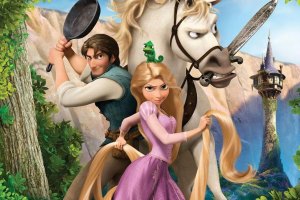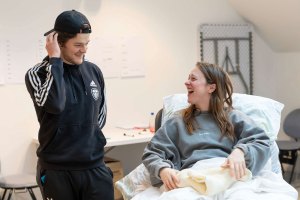Michael Boyd On … Russian Revolutions & the RSC
Three years in the planning, Revolutions, the Royal Shakespeare Company’s investigation into the dramatic life of the countries that made up the former Soviet Union, launches this month with two large-scale commissions of new plays by Russian writers. RSC artistic director Michael Boyd explains the thinking behind the epic four-year project and recalls his own experiences as a young trainee theatre director in Moscow.

Twenty years ago the Berlin Wall came down while I was running a festival of Soviet theatre called New Beginnings. I had organised this festival at the Tron Theatre in Glasgow as part of the build up to the city’s year as European Capital of Culture in 1990.
It was the opening night of Cinzano, a new play by Lyudmilla Petrushevskaya, and a co-production between the Tron and the Chelovyek Studio Theatre from Moscow. The cast of Peter Mullan, Forbes Masson and Paul Sampson had been brilliant, the play was a great success and the Wall was down. After all the congratulations, I found Roman Kozak, the director, and Arkadii Tsimbler, the dramaturge and translator hunched around a tiny television in the dressing rooms looking depressed.
“What’s the matter?” I asked, “It’s great, isn’t it? And it’s Gorbachev who’s letting it happen.” They were depressed because they felt lonelier than ever as Russians. Now all the Warsaw Pact countries would escape and find freedom with the West. Russians alone would stay oppressed. Russia, they believed, would never melt.
Twenty years on from Perestroika and the fall of the Wall, the Royal Shakespeare Company is staging REVOLUTIONS, a four-year exploration of Russian theatre and culture. It begins this September in Stratford-upon-Avon with a packed programme of new plays and debates, and will conclude with major commissions to Russian theatre artists as part of our World Shakespeare Festival in 2012.
The Stories Behind the Stories
One of our opening pieces, The Grain Store by Natalia Vorozhbit takes place in Ukraine. The play is the story of Vorozhbit’s family’s village during the Great Famine of 1933, which killed more than five million people, as the result of enforced agricultural collectivisation under Stalin. Described as “the hidden holocaust” and known as the “Holomodor”, it is little heard of outside of Ukraine.

Natalia Vorozhbit with Michael Boyd
Vorozhbit is also the reason our festival is called REVOLUTIONS. In 2005, the RSC invited 12 young writers to Moscow and worked with them for a week on Shakespeare’s dramaturgy. For example, they studied Shakespeare’s love of plays within plays and of low comedy at a tragic crisis, his ruptured banquets, weddings and funerals, his treatment of the supernatural and the metaphysical, and his yoking of the powerful and the disempowered into the same narrative. The Grain Store was one of the first plays to do well from these workshops and we could no longer call our season ‘Russia’, or ‘Russian Theatre’.
At first, we thought ‘Other Russia’ might do, as a witty curtailment of ‘Mother Russia’ which could accommodate former Soviet countries such as Ukraine. ‘Other Russia’ also accommodated the sense of Russia as somehow ‘Other’ which had so disconcerted Roman and Arkadii in 1989. Then we discovered ‘Other Russia’ was already the name of a right-wing political party, and some Ukrainians were expressing a distaste for anything with Russia in the title – so REVOLUTIONS it was.
A Romance with Russia
My personal relationship with Russia, which started when I was a schoolboy, was certainly shaped by excitement at the violent upheaval brought about by the 1917 revolution. It was also brought on by the intriguing sense of Russia as ‘other’: a forbidden land of mystery which was nonetheless disturbingly familiar. The spy scenarios of The Man from Uncle and James Bond films were straightforwardly glamorous, but there was an exotic odour of transgression around reports of British KGB agents that also had its appeal. At the age of 12, I had to choose between chemistry, German and Russian as subjects. The secret code of the Cyrillic alphabet easily won me over to the other side.
Ten years later, when I arrived in Brezhnev’s Moscow as a trainee theatre director in 1980, it felt like I was landing on the moon, or rather in a dream. This was still Europe, but everything looked, smelled and felt so profoundly unfamiliar. Being woken in the train and coldly interrogated by East German border guards in Berlin had been a shock, but the real sense of crossing into another world began at Brest on the Soviet Border. Here, the entire train was raised into the air to have its wheel carriages replaced for Russia’s wider railway tracks.
I arrived 12 hours later than expected into Byelorusski Station and have few memories more vivid than my first taxi journey through thick snow and massive boulevards. The streets were sparsely populated with two makes of car – the larger Volga, and the smaller, newer Zhiguli. The taxi drove past enormous and impressive buildings with ten storey portraits of Marx, Engels and Lenin against blazing red backgrounds proclaiming the glory of work and the working people.
In the middle of Kalininskii Prospekt, my taxi suddenly swerved to a halt in the sludge at the side of the road. I asked what was happening and the driver said that someone was coming. Then, the largest car I had ever seen, black and travelling like a bullet, tore past us escorted by four other cars into the snow ahead. Adrenal, and already the fearless foreign dissident, I asked why we’d had to pull over. The driver just said it was better to do so.
He dropped me outside the grand old British Embassy, which was punching way above its weight across the river from the Kremlin. Once I’d got past the Russian police, I was shown into a waiting room while they phoned for the cultural attache’s wife to come and fetch me.
From the moon you can see the Earth more clearly, and I saw that on the coffee table of the waiting room was Country Life, the Sunday Post and the Daily Telegraph. The Earth looked very small. I felt decidedly Russian, and resolved to learn as much as I could from this great, frightening, bungled country. I was also determined to learn from the brilliant and courageous theatre artists working against the odds under the watchful eye of the Communist Party.
The Truth in Theatre
At the Malaya Bronnaya Theatre under Antolii Efros, I witnessed theatre making that was not afraid of being bold, expressive and challenging, or of its deep duty to tell the truth. I saw a theatre director given responsibility to be an artist in his own right and big enough to embrace that responsibility in a world where theatre was the most important art form. Poetry, film and the novel were easily censored, and music and art were less dangerous.
I saw how Efros and his actors benefitted from working as an ensemble, refining their working practices over decades together. They achieved trust, an intimacy and a playful nature hard to sustain while in the hire and fire culture of British theatre. I witnessed the rigour of artist’s training, which was longer and tougher than in Britain. I also endured the laughter of colleagues as I explained that at the age of 22, I would soon be returning to Britain to direct professionally.
I queued as others did at the theatre ticket offices outside every Metro station and bought tickets for less popular shows. I did this ‘as a burden’ to be permitted to attend burning hits like Lyubimov’s Master and Margherita or Efros’ The New Don Juan. I saw a brilliant sculptural use of theatrical space in these theatres and in site specific productions, which were clearly inspired by the teaching of the great post Revolutionary director, Meyerhold.
I did not see Meyerhold’s blueprints for his ‘Theatre of the Future,’ which was designed to be a one room space fit for conjuring the urgent shared discourse of Russia’s new society. I did, however, read Mayakovsky, who cited Shakespeare’s open spaces and bold lyrical language as the only model for a truly public revolutionary people’s theatre. In 2008, I found out that the blueprints of the planned Meyerhold space were almost identical to that of the Courtyard Theatre and the new Royal Shakespeare Theatre.
I saw Tostonogov’s famous production of Dickens’ “Pickviski Club” which was an inspiration for the RSC’s Nicholas Nickleby. I was handed a banned play from the twenties, The Suicide by Nikolai Erdman, to smuggle out of Russia. I smuggled it nervously past the guards at Brest only to discover that it was already playing at the Aldwych Theatre with Roger Rees in the title role of an RSC production.
Where the Stories Have Led Us
From Peter Brook‘s devotion to the teachings of both Meyerhold and the mystic Gurdjieff, through the work of David Jones on Maxim Gorky, plus the decades of RSC productions of the world’s second most produced playwright, Anton Chekhov, the RSC has had a long and deep association with the Russian theatre tradition. So once I became artistic director of the company, and after I had commissioned our investigation of Spanish Golden Age drama in 2005, it seemed natural to start planning an engagement with Russia.
The young writers we met in Moscow in 2005 were small children when the Berlin Wall came down and have grown up in a political environment totally unfamiliar to their parents. They have grown up to more established playwrights, whose writing was always set against a backdrop of the all-pervasive Soviet state, and whose fingers were used to dancing with the censors before they even hit the keyboard.
After 1989, Russian theatre along with the economy made a mad dash to the license, liberties and commercialism of the West. As other media and art forms found more freedom, the theatre lost its monopoly of the role of subversive truth teller, and struggled to find a new distinctive voice of its own.
The Latest Chapter
I think we’re presenting that new voice in Stratford, and our first two commissions draw inspiration not just from our Shakespearian workshops in 2005, but from the writers’ native theatrical inheritance. The Durnenkov brothers’ darkly comic play The Drunks, tells the story of a young soldier returning from the Chechen war to find himself exploited as a wounded hero by warring political factions. It reminds me of The Government Inspector, but even more of Erdman’s Suicide.
Vorozhbit’s The Grain Store takes place near the birth place of Gogol. Gogol, like Vorozhbit, is a Ukrainian who writes in Russian. Like Shakespeare, Gogol shows people behaving both ridiculously and tragically under enormous pressure, and like all Ukrainians, her imagination is never far from the supernatural.

Jonjo O’Neill in rehearsal for The Drunks
Around these plays, we’ve assembled a feast of post-Soviet culture. We’ve included everything from talks and debates from some of Russia’s most dynamic contemporary commentators and theatre artists, to a weekend of play readings by some of the hottest writers from the former Soviet states. We also have a late-nighter featuring Top 9, Russia’s world champion break-dancing crew.
REVOLUTIONS is a strand of work which will run through our stages for the next few years. Our associate director, David Farr and the Filter theatre company are working together on a piece about artist censorship called Silence. Rona Munro has written a new play about the Space Race, Little Eagles. We will also be celebrating the work of Chekhov, Gogol and Pushkin. Pushkin wrote Boris Godunov, which was a conscious decision to stage Russian history in the manner of Shakespeare’s English histories. Greg Doran, our chief associate director, will direct Boris Godunov in a brilliant new version by Adrian Mitchell, which was his last piece of work before he died.
Staff at the RSC are taking Russian lessons, and our rehearsal rooms are reverberating with Russian and Ukrainian song. Russia remains the largest and most fascinating country in the world: a European land which looks to London and Paris, and an Asiatic one which holidays on Chinese beaches. Russia is a citizen of the Arctic and a quasi Mediterranean through its Black Sea Shores. It is an atheist, a Muslim, a nomadic pagan, and an orthodox Christian. It is a fabulously wealthy Klondike capitalist, a subsistence farming peasant, an oilman, a fur man or the embattled bureaucrat trying to regulate this vastness.
Thirty years on from my traineeship in Moscow, and 20 years on from the fall of the Wall, even more countries have ”escaped” than dreamed of by Roman and Arkadii. The Warsaw Pact has flown westward, and much of the Soviet Union has as well. Now the dream of Ukraine is to join the European Union and Georgia in courting the North Atlantic Treaty Organization (NATO).
Has Russia itself escaped? Were Roman and Arkardi wrong 20 years ago in Glasgow? Market capitalism has mushroomed in Moscow, revolutionary banners have been replaced by smiling insurance adverts, and the boulevards are choked with BMWs and Mercedes. Abramovich has bought Chelsea, Arshavin has bolstered Arsenal’s attack, and the British political elite pay sycophantic court to morally interesting oligarchs. However, Russia is still considered to be the ‘other’. Is it because Russia is a great misunderstood neighbour or because of the unfathomable tyranny of Ivan the Terrible, Peter the Great and Stalin?
Russia Still Remains
Just one year on from the Russian invasion of Georgia, it’s worth noting that Russia is also still in deep shock. This is from being told that three generations have been wasted on a failed revolution, from losing its sense of potency in the world and from the perceived loss of limbs such as Ukraine, which Russia still regards as utterly Russian.
Georgia now fears more aggressive moves from Russia. Ukraine and the Baltic States are under constant diplomatic and economic pressure from their resentful, hurt and domineering neighbour. Stalin, Georgia’s most notorious son, came second recently in a poll amongst Russians to identify their most popular national figure. Many believe that it was him, and not Alexander Nevsky, who emerged as the all-time champion of the Russian people. However, the authorities did not believe that time was right to admit it.
Russia feels disrespected by the West, and is responding with defiant nationalist pride. One of Vladimir Putin’s first acts as president was to revive Stalin’s Soviet national anthem. “We can’t allow anyone to impose a sense of guilt upon us,” was Putin’s message to a group of history teachers brought together in 2007 to discuss the teaching of their Soviet past.
Unlike elsewhere in Eastern Europe the secret police files of the Stalinist era have not been made public in either Russia or Ukraine. Forty years on from The Man from Uncle and my recruitment to the secrets of the Cyrillic alphabet, and 20 years on from the Perestroika pessimism of Roman and Arkadi, REVOLUTIONS will explore the great paradox that is Russia today.
The Grain Store and The Drunks both premiere on 24 September 2009 (previews from 10 September) at the Courtyard Theatre in Stratford-upon-Avon, where they run in rep until 1 October 2009.












